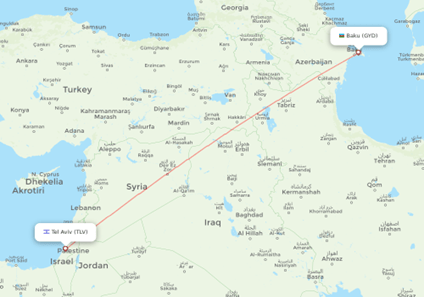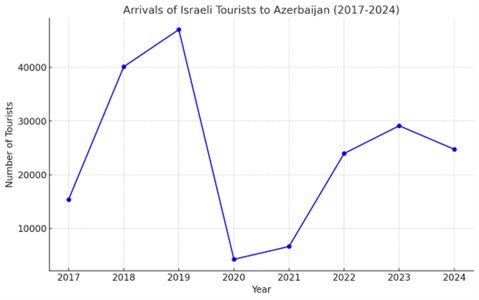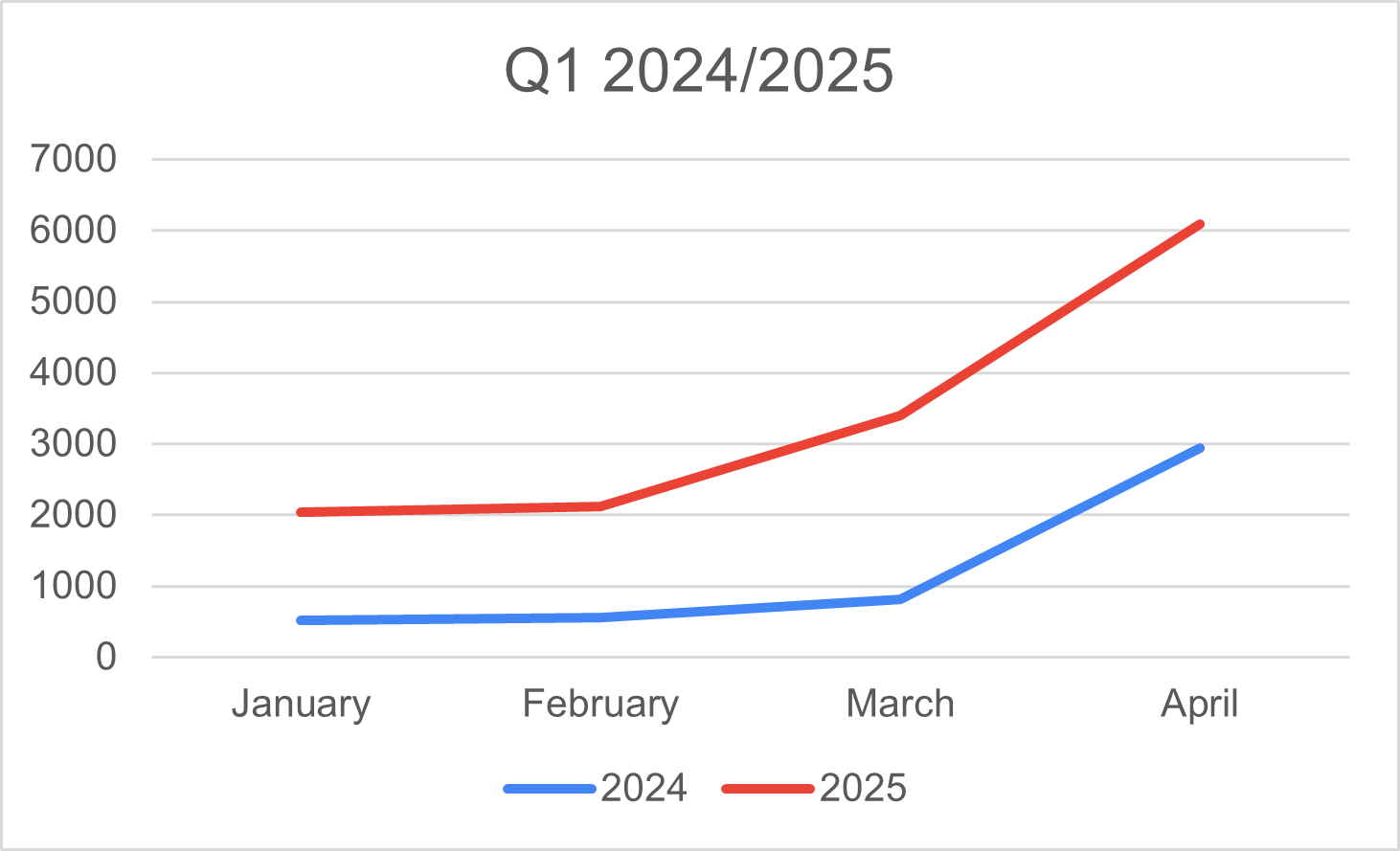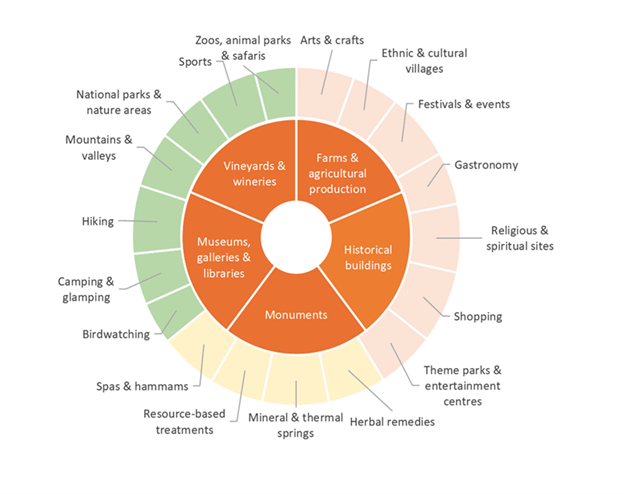Israel
country profile
June 2025
Israel is among leaders in the share of people taking international trips. It is a rapidly growing outbound travel market in the Middle East region, with a significant importance to tourism destinations in Europe and the Eastern Mediterranean. Before the Gaza war, Israel has been a key outbound travel market for numerous destinations in Europe and the Mediterranean region. Israelis have taken over 7 million outbound trips 2024, down (only) by 22% compared to 2023. Resulting from Israel’s geographic location, 92% of these trips were made by air. The top 5 first destinations for flights to/ from TLV in 2024 were Greece, US, Cyprus, UAE, and France. Among the destinations recording the highest level of growth in Israeli travel are Czech Republic (+59%), Georgia (+34%), Thailand (+27%) and Cyprus (+10%). Resulting from airline flight cancellations to Israel due to the war, the share of Israeli carriers in TLV surged from 35% in 2023 to 66% in 2024. The top 5 airlines in flying to/ from Israel in 2024 were El Al, Israir, Arkia, WizzAir, and Fly Dubai.
ATB is focused on highlighting Azerbaijan's rich culture, nature, Jewish heritage, shopping and cuisine. Due to the war situation, Israelis stopped traveling to some popular destinations, discovering new destinations and paying more attention to Azerbaijan’s offerings. From 2024 numerous travel agents organized their first ever tours to Azerbaijan. Starting from 2025 increased interest is explicitly demonstrated by Israeli tourists pushing local tour agents to organize trips to Azerbaijan and find partners for long-term cooperation.
Rosh Hashanah (Jewish New Year) - two-day holiday. Usually occurring in September or October.
Yom Kippur, the holiest day of fasting and prayer. 10 days after Rosh Hashanah.
Sukkot holiday - An eight-day festival that usually falls in September or October.
Simchat Torah - Immediately following Sukkot;
Passover (Pesach) holiday - usually occurring in March or April and lasting for seven or eight days.
Shavuot - two-day holiday; usually occurs in May or June.
July-August – The summer period (school holidays)
Israeli travelers can be divided into several categories based on age, language, belief, interests, behavior, etc. However, 4 main groups can be outlined:
Families: Israel is a very familial country. Usually, large families of from 4 up to 15 people.
Young Couples: The younger generation, especially Hi-Techers, usually travel 3-4 times a year and go on shorter holidays on weekends. Soldiers after army service also can be referred to this category.
Group Tours: Usually, Israelis aged 50+ organized by groups of 15-25 people, guided by a travel agent
Business: due to strong business ties with Azerbaijan a lot of Israelis travel to for business purposes.
Religious travellers: mostly travel in large groups; trips are organized by a trusted travel company, planned long in advance.
Nature: Living in an extremely hot climate Israelis are seeking for variety in nature.
City Breaks: Travelers are interested in what can be offered by a modern city.
Gastronomy: Special groups of tourists travel for tasting food and wines.
Jewish heritage: Groups of travellers visit historical spots and sightseeing places of Jewish heritage
Religious tours: Groups of religious travellers visit synagogues, meet Rabbis, celebrate religious holidays.
Wellness and Medical Tourism: Israelis are interested in SPA treatments and relaxation facilities (thermal springs, therapies, etc.), as well as in dentistry services.
Shopping: Considering high prices in the country, Israelis are using every opportunity to make shopping abroad.
Cruises: Popular among Israelis, ships depart from Haifa to the cities of the Mediterranean basin.
LGBTQIA+ Holidays: Provided Tel Aviv is the capital of LGBTQIA+ of the Middle East, this type of travels is popular in LGBTQIA+ community.
Safety and Security: Prioritize safe and stable destinations.
Comfort and Quality: Favor high-quality accommodations and services.
Value for Money: Seek good value and affordable pricing.
Well Planned Packages: Use conservative ways of travel ordering through travel agents.
Spendings of Israelis on average abroad dropped from $3,000 in 2018 to $2,219 in 2022.
Large families
Group of Seniors
Couples
Groups by interests
Friends’ groups
Social Media (Facebook; Instagram; Telegram)
Travel blogs and forums
Travel agencies
Online travel agencies (OTAs)
Recommendations (Word of Mouth)
Local events and festivals
The vacation planning and travel decision period among Israelis can vary based on:
High season and peak travel times - During school holidays (such as summer vacation) and major Jewish holidays (like Passover, Rosh Hashana or Sukkot), planning typically starts 6 months to 1 year before to secure preferred travel dates and accommodations. 3-6 months before they already start booking their flights and accommodations.
Last-minute bookings - For shorter trips or more flexible travellers, decision-making can happen closer to the departure date, sometimes within a few weeks or even days.
Travel agencies
Online last-minute bookings
Online bookings in advance
Online travel agencies (OTAs): Secret Flights, daka90, lasminute.co.il
Specialized providers: Hotels.com, Booking.com, Airbnb
Most visited travel and tourism websites: lametayel.co.il, booking.com, tripadvisor.co.il, websites of airlines
Trips for people united by interests (photographers, dancers, hikers, skiers, birdwatchers etc.)
“Trips to the Roots” – people from older generations organize a trip for children and grandchildren to the countries of their origin
Visits to the graves of famous rabbis
In 2018, the average travel duration booked by Israeli tourists was 8.9 days. Lately, that number decreased by over a quarter (27%) to 6.5 days.
Ophir tours
Flying carpet
Eshet tours
Atlantis Travel Company
Caspi Aviation tours
Daka90 travel agency
Asia travel agency
Diesenhaus travel company
Mona tours agency
Rimon Tours

Tel-Aviv – Baku 14 times a week via AZAL
Tel-Aviv - Baku 3 times a week via Israir (mostly sold in packages)
Updated information about flight connectivity can be found on the interactive board of the State Tourism Agency of the Republic of Azerbaijan.
International Mediterranean Tourism Market (IMTM)
Between 2018 and 2023, the number of Israeli tourists visiting Azerbaijan has shown significant fluctuations, reflecting a dynamic trend driven by various global and regional factors.
In 2018, the number of Israeli travellers stood at 40,082, indicating a healthy level of tourism. This figure grew further in 2019, reaching 47,003, marking a steady increase in interest from Israeli tourists. However, the onset of the COVID-19 pandemic in 2020 led to a dramatic decline, with only 4,238 Israeli tourists visiting Azerbaijan. The restrictions on international travel and health concerns largely explain this sharp drop.
In 2021, the numbers started to recover slightly, with 6,622 Israeli tourists arriving in Azerbaijan, showing early signs of post-pandemic recovery. However, the most notable rebound came in 2022, when the number of Israeli tourists surged to 23,935, reflecting the easing of travel restrictions and renewed interest in international travel.
This upward trend continued in 2023, with 29,093 Israeli tourists visiting Azerbaijan. The steady growth from 2021 to 2023 demonstrates a strong resurgence in tourism, driven by improved conditions, increased connectivity, and the appeal of Azerbaijan as a destination for Israeli travellers.

Source: State Migration Service
Comparison of the Q1 of 2024 and 2025 shows 183% increase in visits of Israelis to Azerbaijan.

A significant portion (79.4%) of Israeli tourists travelled for this purpose, making it the primary reason for visits. 11.8% of Israeli tourists visited for this reason, showing a moderate amount of family or friend-related travel. Together with this, 5.9% of Israeli travellers came for health or medical care purposes, indicating interest in medical tourism.
The majority of Israeli tourists fall in the range of 500-3000 AZN, with 500-1000 AZN being the most common expenditure range. Therefore, the average Israeli tourist likely spends between 1000-3000 AZN during a trip to Azerbaijan, half of the total budget spent on accommodation, food and event activities.
13.5% of Israelis stayed in Baku for 2-7 nights, while 16.7% spent more than 31 nights in regions.
The most visited regions by Israelis in Azerbaijan are Gabala, Guba, Gusar, Gobustan and Naftalan.
Israeli tourists show preference for various tourism products such as nature, gastronomy and wine, sightseeing, skiing, outdoor activities, SPA and wellness. Due to variety of the tourists’ groups subject of interests may significantly vary still falling under the ATB product categories and sub-categories.

|
|
Fits all |
Add-ons |
Tailored |
|
Historical Buildings |
|
|
|
|
Monuments |
|
|
|
|
Museums, Galleries & libraries |
|
|
|
|
Sports |
|
|
|
|
Ethnic & Cultural Villages |
|
|
|
|
Farms & agricultural production |
|
|
|
|
Shopping |
|
|
|
|
Vineyards & wineries |
|
|
|
Israeli tourists are interested in all the products grouped into “Fits all” – products that all first-time visitors should see or experience, as well as in “Add-ons” – products that can be seen or experienced with longer or repeat visits, and “Tailored” – products that are considered of specific relevance to the market.
In Q1 2024, Israelis took over 1 million outbound trips, down by 45% compared to January-March 2023. This drop is explained by the war actions happening in the south and north of the country. Nevertheless, the rebound of Israelis traveling abroad is surprisingly high (74% of the numbers for the same period of 2023) especially considering the high increase in air ticket costs, the devaluation of the NIS and the somber mood of the Israelis. Many airlines cancelled flights to and from Tel Aviv throughout 2024 due to military operations and unstable situation. This situation of instability lasted in the beginning of 2025, negatively impacting travel plans of Israeli tourists. Israelis being leaders in outbound travels will restore their trips upon normalization of the situation.
Relative and friendship ties and connections are extremely important in the community.
It is crucial to make connections and set friendly relations with potential partners of all categories and on all levels.
The best time for launching marketing campaigns is 4-6 weeks before holidays.
Face-to-face meetings in a non-formal manner are highly productive.
Show ups in events, as well as in online ones, usually are low.
Gifts, attention marks on holidays are highly appreciated.
Key market centers to visit are Tel Aviv, Haifa, Ashdod.
Despite the negative effect of the war in Gaza (Swords of Iron) on outbound travel from Israel, Israel's outbound travel market demonstrates a strong recovery, and 2025 is expected to be a record breaking year in outbound travel from Israel. This include an increased desire for emotional wellness and stress relief tourism (soft travel), and surge in interest for short and medium haul destinations that are welcoming for tourists from Israel.
Jamilya Talibzade, Director of Representation Office in Israel